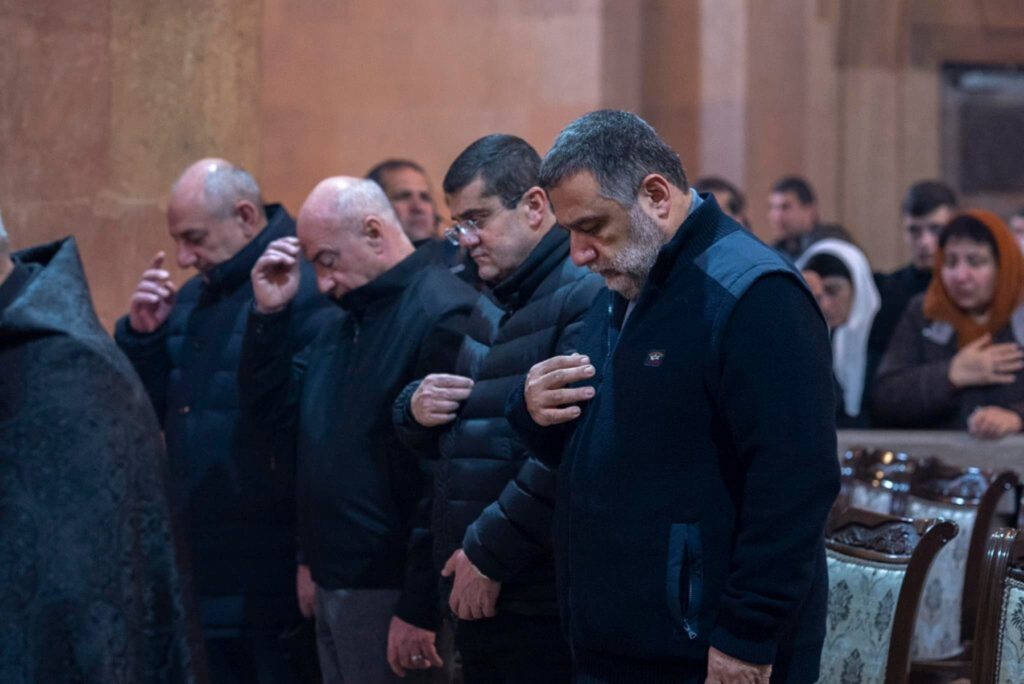Three former presidents and the acting parliamentary speaker of Nagorno-Karabakh were arrested by Azerbaijan on Tuesday, bringing the total number of detained former and acting officials to eight.
Three former presidents of Nagorno-Karabakh — Arayik Harutyunyan (2020—2023), Arkadi Ghukasyan (1997—2007), and Bako Sahakyan (2007—2020) — as well as the Speaker of the National Assembly, Davit Ishkhanyan, were arrested by Azerbaijan on Tuesday and transferred to Baku.
APA, Azerbaijan’s government press agency, reported that they were detained by the State Security Service of Azerbaijan and brought to Baku to face criminal charges. Azerbaijan considers serving in Nagorno-Karabakh’s government a crime, as Nagorno-Karabakh has since 1991 been recognised by almost all countries and international organisations as Azerbaijani territory. Some of those who were detained are also accused of committing war crimes during the First Nagorno-Karabakh War.
Armenia’s Foreign Ministry on Wednesday ‘strongly condemned’ the arrests of the Nagorno-Karabakh officials.
The ministry stated that ‘arbitrary arrests’ were continuing despite meetings between officials from Azerbaijan and Nagorno-Karabakh, and statements from Azerbaijani officials asserting their commitment to respecting and protecting the rights of Nagorno-Karabakh’s Armenian population and establishing peace in the region.
The Foreign Ministry added that Armenia would take ‘all possible steps’ to protect the rights of ‘illegally detained’ Nagorno-Karabakh officials, including taking the cases to international courts, and called on international partners to address the issue with Azerbaijan and at international platforms.
Since 24 September, when the region’s population began to flee to Armenia, Azerbaijan has detained former Minister of State Ruben Vardanyan, former Commander of the Defense Army Levon Mnatsakanyan and former Deputy Commander of the Armed Forces Davit Manukyan at the Lachin checkpoint. Former Minister of Foreign Affairs Davit Babayan handed himself in to Azerbaijan on 28 September.
Speaking at a session of government on the same day, Armenia’s Prime Minister Nikol Pashinyan stated that Armenia’s state bodies needed to take steps to protect the rights of people ‘arbitrarily arrested’ before and at the Lachin checkpoint.
He described the arrests as ‘disturbing’, and stated that analyses suggested that all of Nagorno-Karabakh’s Armenian population would have left Nagorno-Karabakh in the coming days.
Vitaly Balasnyan, Nagorno-Karabakh’s former Security Council secretary, on 28 September denied that he had been detained, stating that he had not attempted to cross to Armenia, and planned to remain in Nagorno-Karabakh.
Other Nagorno-Karabakh officials have successfully reached Armenia. On Tuesday, Nagorno-Karabakh State Minister Artur Harutyunyan told RFE/RL that he, as well as National Security Service director Ararat Melkumyan, Interior Minister Karen Sargsyan, and the head of the president’s staff had arrived in Armenia via the Azerbaijani checkpoint. On Wednesday, Nagorno-Karabakh’s acting president, Samvel Shahramanyan, also arrived in Armenia.
Stepanakert ‘deserted’ and ‘surreal’
International Committee of the Red Cross (ICRC) representatives told Reuters that only ‘a few hundred’ people remained in Stepanakert, including the sick, disabled, and elderly.
ICRC team lead Marco Succi described the empty streets of the region’s capital as ‘surreal’, and stated that city was ‘completely deserted.’
On Monday night, police and rescue workers left Nagorno-Karabakh for Armenia, along with service equipment and fire lorries. They announced that they had found that their searches for people and bodies, following both Azerbaijan’s attack on Nagorno-Karabakh and the explosion of a fuel depot in the region, had ‘not given any results’ in recent days.
Over a week after Nagorno-Karabakh surrendered to Azerbaijan, over 100,000 have left, with former State Minister Artak Beglaryan on Saturday stating that ‘at most a few hundred people’ remained in the region, and that they were also leaving.
While official estimates before the war put the population at around 120,000, it remains unclear how much, if any, of the population has remained.
For ease of reading, we choose not to use qualifiers such as ‘de facto’, ‘unrecognised’, or ‘partially recognised’ when discussing institutions or political positions within Abkhazia, Nagorno-Karabakh, and South Ossetia. This does not imply a position on their status.




 4 October 2023
4 October 2023



